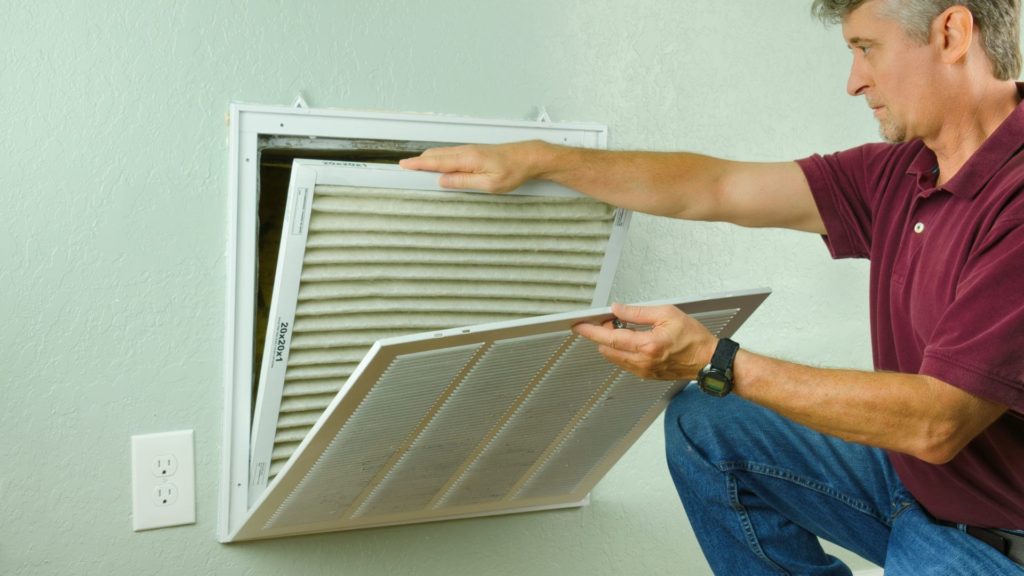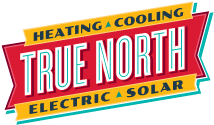Air conditioners are an essential part of daily life— especially here in central Ohio! But does your air conditioner filter out pollutants to improve indoor air quality? The answer is more complicated than you might think!
Understanding How Your AC Works
Your air conditioner’s main job is to make your home comfortable by heating and cooling it to your satisfaction. This is achieved by drawing out the warm air or injecting cool air through the use of a refrigerant loop and heat exchanger.
While your AC’s primary function is temperature and humidity control, it can also remove debris and many types of pollution from your conditioned spaces. These contaminants—such as dust, pollen, dander, mold and in some cases bacteria—can be trapped by your AC’s filtration system to keep them from circulating into your home. Air conditioners remove pollutants in the air through the use of filters on the intake side of the system. Inside air is generally much more polluted than outdoor air, so it’s vital to have quality filtration that can keep indoor air clean and healthy for you and your family. However, some filters do a better job of sifting out contaminants than others.
Choosing an Air Filter
So can your air conditioner improve the quality of air in your home? Not by itself. To improve air quality, your AC requires the right filter.
The efficiency of an air filter is measured by its minimum efficiency reporting value, otherwise referred to as its MERV rating. This rating ranges from 1 to 20 — the higher the rating, the more effective the filter. It’s recommended that homes and businesses use filters rated between MERV 8 and 13.
Here are some popular MERV ratings and the contaminants they will remove from your air:
- MERV 8: Mold, dust, pollen, dirt, and carpet fibers. Stops up to 35% of particles.
- MERV 9-12: Everything mentioned above, plus flour in the air and vehicular emissions. Stops up to 45% of particles.
- MERV 13: Everything mentioned above, plus bacteria, virus particles, and tobacco smoke. Stops up to 90% of particles.
Overall, HEPA filters (or High-Efficiency Particle Air filters) are the most effective, removing 99.7% of particles and allergens from the air.
Did you know that air pollution particles can be so small that they can’t even be identified under a microscope? Don’t let these pollutants sneak into your home! Contact True North for air quality testing in your home.
Replacing Your Air Filters
It’s important to change your air filter per the manufacturer’s recommendation, so that your HVAC system can continuously improve your indoor air quality. Changing the filter is usually a very straightforward process, as the manufacturers generally make them quite accessible. Your HVAC professional will gladly instruct you in the process during your yearly maintenance visit.
Your AC’s indoor evaporator coil should also be cleaned periodically. This is the coil that sits above or next to your furnace, and can become covered in dust and dirt if a very porous filter is used, or if the filter is unchanged for an extended period. Unrestricted airflow is important in maintaining your family’s comfort and creating balanced airflow within the home. Keeping the evaporator coil clean is important so that it doesn’t reintroduce air pollutants into the home if they by chance got past the filter.
Eliminating Indoor Air Pollution
Besides selecting the most appropriate air filter for your needs and replacing it regularly, follow these additional steps to improve your indoor air quality and keep your air conditioner in top condition. These steps include:
- HVAC System Upkeep: An efficient air conditioner can help improve your indoor air quality. Be sure to schedule routine maintenance for your HVAC system to prevent any unwanted issues. Yearly maintenance is required by the manufacturer to keep your warranty in force. Filter replacement, coil cleaning and tune-ups all help keep your AC performing in top condition.
- Natural Ventilation: Opening the windows of your home is an energy-efficient way to introduce additional fresh air during the spring and fall when your system isn’t needed.
- Use a Vacuum: Clean carpets and floors with a vacuum to remove any debris or dirt introduced from outside your home.
- Try an Air Purifier: An air purifier with a built-in HEPA filter is a great way to improve air quality, especially if you have allergies. These devices help to clean indoor air and usually have multiple settings. The nice thing about a portable air purifier is it can be used as needed per room – such as in your bedroom at night, to boost the efficiency of your HVAC system.
Contacting an HVAC technician
Your air conditioning system can go a long way toward reducing the level of air contaminants in your home. An HVAC technician can also provide air quality inspections, which can help improve indoor air quality.
True North offers air quality improvement services that can determine the pollutant levels in your home. Schedule indoor air quality testing with us at your convenience.
For more information about the benefits of air quality testing, contact True North today!

